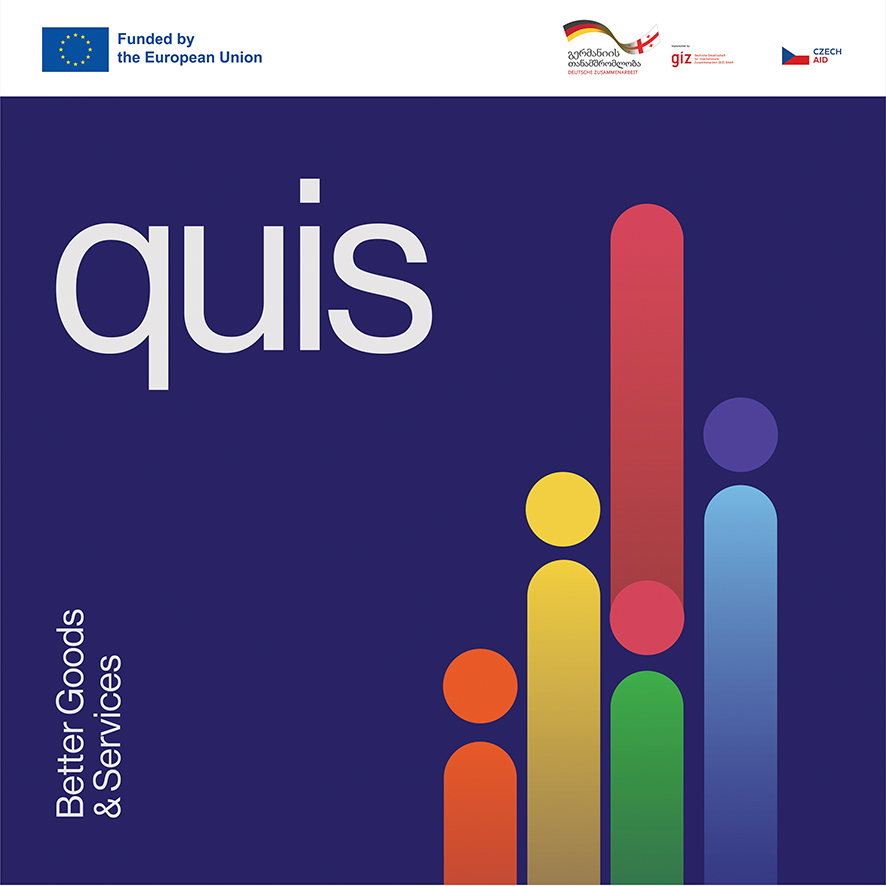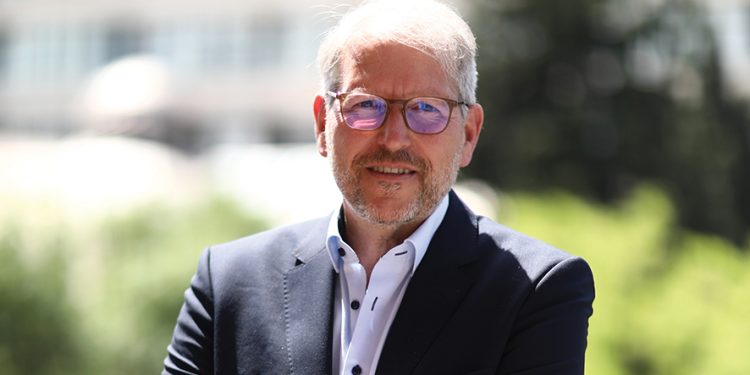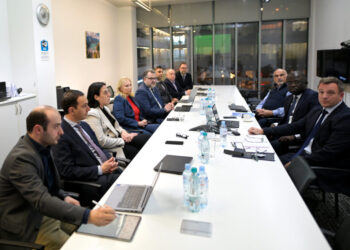The QUIS – Better Goods and Services project, funded by the European Union and the German Government, aims to enhance the competitiveness of companies in Georgia by improving Quality Infrastructure (QI). Its primary goal is to promote inclusive and sustainable growth while aligning with the Deep and Comprehensive Free Trade Agreement (DCFTA) and EU commitments, ultimately fostering free-market competition and sustainability within Georgia’s private sector.
Implemented by GIZ in collaboration with the Czech Development Agency, the project works closely with key partners, including the Ministry of Economy and various Georgian agencies. Its initiatives include:
• Identifying and improving the regulatory framework for quality infrastructure;
• Conducting awareness campaigns on product quality and providing technical advice to businesses;
• Raising quality standards in local production and supporting conformity assessment bodies;
• Developing targeted financial support mechanisms with Enterprise Georgia.
With a total budget of €12,025,000, the project is set to run until January 2027.
GEORGIA TODAY sat down with Christian Kaufhold, team leader of the QUIS project, to find out more. First, we wanted to learn how he ended up working in Georgia.
“My journey to Georgia began with a diverse career in consulting, where I focused on local and regional economic development across Central, Eastern, and Southeastern Europe, including the Caucasus,” he tells us. “Over the years, I’ve had the privilege of working on various projects that involved tourism development, market analyses, and feasibility studies for the hospitality industry. This experience not only deepened my understanding of the region’s economic landscape but also sparked my interest in contributing to meaningful change.
“In 2008, I joined GIZ, where I took on roles that allowed me to lead and be part of development projects. My work has consistently revolved around promoting sustainable development, and that’s what ultimately brought me to Georgia. I believe that effective, well-planned projects can transform economies and elevate local businesses. I’m excited to be part of a team dedicated to driving positive change. Currently, I am a team leader of the 3-year project ‘QUIS,’ – Enhancing Company Competitiveness through Quality Infrastructure.”
What are Georgia’s current weaknesses, and how will they be addressed in the three-year project?
Harmonized standards are a fundamental aspect of the DCFTA’s goal of deeper economic integration between Georgia and the EU. They pave the way for long-term collaboration and trade relations, fostering economic growth and development. As Georgia moves toward adopting EU standards, it’s crucial to focus on enhancing quality infrastructure. This is not just about identifying weaknesses, but more like an opportunity, I would say, to align with international best practices that elevate the private sector.
We believe the QUIS project, implemented by GIZ and CzDA, will play a significant role in this process. The project aims to address key factors in Georgia’s quality infrastructure by identifying important aspects of this framework. The project will foster synergy between private and public entities, ensuring a collaborative approach to improvement. Additionally, the delivery of technical international expertise to quality institutions will enhance their capacity to support businesses in adhering to European standards.
Through impactful awareness campaigns, support for local production, and targeted financial mechanisms developed in partnership with our stakeholders, the QUIS project seeks to elevate the quality standards in Georgia, ultimately bolstering the competitiveness and sustainability of the private sector.

Please give some examples of the campaigns that will be run. Which private enterprises will benefit? What are some of the standards that Georgia needs to meet in the immediate and long term?
To meet the standards required by the DCFTA, Georgia must focus on several immediate and long-term requirements. In the short term, it should develop comprehensive strategies to deal with technical barriers to trade, including promotion and cooperation between their respective organizations, public or private, responsible for metrology, standardization, market surveillance, conformity assessment and accreditation to align with EU standards. Building on these foundational efforts, it is essential to strengthen institutional capacities for effective implementation and enforcement of these regulations, along with fostering public awareness and engagement.
To promote product quality standards in the country, the project will focus particularly on the construction materials, toy and wooden material production, apparel and packaging sectors. Our project will implement several impactful awareness campaigns tailored to both consumers and businesses. These campaigns will educate consumers about the importance of product quality, and help them identify compliant products, utilizing informational materials, video content, successful case sharing, and media outreach to raise awareness about the benefits of choosing products that meet European standards.
For private enterprises, we will conduct targeted campaigns focused on specific sectors, including construction materials, apparel and fashion, toys, wood and furniture, and packaging materials. These industries are crucial for Georgia’s economy, and hold significant export potential.
Our interventions for the private sector consist of several stages: training and awareness-raising, gap analysis, action plan development, implementation, and certification. This is a long-term process that requires not only our involvement, but also the interest and engagement of the companies and stakeholders involved.
Where does Georgia currently stand in its alignment with EU requirements?
Georgia is actively working on aligning its legal and regulatory framework with EU standards to facilitate smoother trade and integration into the European market. This alignment is crucial for meeting the EU’s strict requirements, especially in areas like construction materials, toys, and textiles, which are significant export sectors.
Regarding regulations, which are mandatory for compliance, we have several priorities:
Construction Materials: We are harmonizing with the EU’s Construction Products Regulation (EU) No 305/2011, which sets unified criteria for marketing materials across Europe. This includes conformity assessments and CE marking to ensure safety and performance standards are met for products like cement and insulation.
Toys: The EU’s Directive 2009/48/EC mandates strict safety criteria for toys, including limits on hazardous substances and mechanical safety standards. We are ensuring that Georgian manufacturers align with these rules to meet CE marking requirements, making their products safe for the EU market.
Textile compliance with the EU’s REACH regulation is essential to manage the use of chemicals in textile production. We are also implementing the Regulation on Textile Fiber Names and Labeling to meet labeling standards that inform consumers about the composition and care instructions of textile products.
In addition to regulations, there are voluntary standards that, while not legally required, provide significant benefits. For instance, companies that adopt standards like ISO 9001 for quality management or ISO 14001 for environmental practices can enhance their market reputation and efficiency. These standards help companies improve quality, reduce environmental impacts, and ensure workplace safety.
Our strategy includes a mix of regulatory alignment and voluntary adoption of best practices, supported by initiatives to strengthen testing facilities and provide technical advice to businesses. This comprehensive approach not only ensures compliance but also boosts the overall quality and competitiveness of Georgian products in the EU market.
What is your vision for Georgia’s future in the frames of this project, the production sector, and overall?
My vision for Georgia’s future focuses on transforming its production sector into an innovative and competitive landscape aligned with international standards and driven by sustainable growth.
Prioritizing high-export sectors, will unlock new market opportunities and drive economic growth. Overall, our project will not only raise awareness but also provide actionable guidance to help enterprises achieve compliance, ensuring sustainable growth and enhanced competitiveness.
We aim to strengthen conformity assessment bodies through capacity building and resource allocation. Importantly, we will provide financial support specifically for laboratories to enhance their capabilities.
This initiative will also engage existing and potential laboratory service providers in developing appropriate activities and co-investing in necessary infrastructure. Together, these efforts will enable laboratories to better address gaps and the demand in testing methods related to quality.
By adopting harmonized standards, Georgian products can more easily enter the EU market. These standards reduce technical barriers to trade, allowing for smoother and more efficient trade flows between the two regions. Ultimately, Georgia can enhance its trade relations and position itself as a competitive player in the global economy, laying a solid foundation for sustainable development in the years to come.
Interview by Katie Ruth Davies














